The best laptop for kids in 2024: our favorite kid-friendly picks
These are our best laptop for kids picks on the market right now
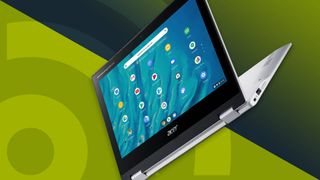
The best laptop for kids needs to fulfill a few important criteria. It should be easy to use, with a solid battery life, good portability, and tough enough to stand up to a few hard knocks here and there. In addition, the best laptops need to offer decent performance when it comes to web browsing, homework, and media streaming.
For a great overall performance, we recommend the Acer Chromebook Spin 311. As with many other best Chromebooks, this is a 2-in-1 model that can be used in laptop or tablet modes, making it versatile and adaptable to your child’s way of working. It’s compact, portable, and sturdy enough to withstand the rigors of the daily school or college commute.
Elsewhere, the Lenovo IdeaPad Flex 3 Chromebook is an ideal laptop for kids, if you happen to be shopping with a smaller budget. It may not win any prizes in the style stakes, but it has a solid performance, a decent battery life, and a robust build quality. Plus, it also offers 2-in-1 functionality.
Of course, the practical applications aren’t the only factors to consider with the best laptops for kids. As with the best student laptops, they represent more than just a work tool. For younger kids, they can be a means to stay in contact with friends and family (under supervision, of course), a gaming device, or a way to enjoy their favorite TV shows and movies.
We’ve sifted through the best laptop models that fit the needs of kids, and our list below has been carefully curated to cover every base, so you can make an informed choice from these reliable options.
The best laptops for kids: our top picks
The best laptops for kids in 2024
Why you can trust TechRadar
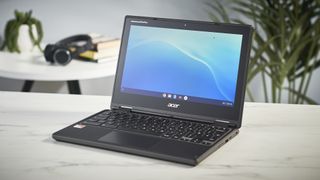
Specifications
Reasons to buy
Reasons to avoid
The Acer Chromebook Spin 311 opts for an AMD APU, which utilizes the well-known Radeon graphics technology for better 3D capabilities - if you have time out of your studies to play some games from the Google Play Store! The dual-core AMD processor does offer Intel-Celeron-beating abilities, by a little at least, and so Chrome OS is going to remain more responsive.
More importantly, the Acer Spin 311 feels durable and well-made, meaning it can handle being dropped in a school backpack or thrown onto the back seat of your car. It’s highly portable and, although the screen disappoints a little by being a touch dull, perfectly usable. At just over eight hours the battery is good though not spectacular for a Chromebook, but balancing that against the great price makes this a strong choice.
Read our full Acer Chromebook Spin 311 review
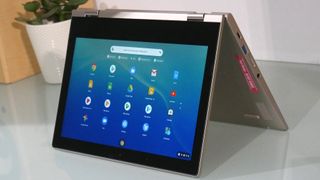
Specifications
Reasons to buy
Reasons to avoid
If you're on the hunt for something super-affordable, the Lenovo IdeaPad 3 Flex Chromebook is an excellent choice. You can pick this model up for a little over $200 in the US now, and it's similarly cheap in most other territories. Even at its original launch price of $339, we still gave it four stars.
No, it's not going to measure up to more expensive laptops when it comes to performance, but the sturdy chassis, long battery life, and touchscreen with a 360-degree hinge for swapping into tablet mode make this the perfect first laptop for a younger child. It should survive whatever your kid throws at it - and thanks to Chrome OS's parent mode, you can rest assured that your child's digital safety is secure.
Read the full Lenovo IdeaPad Flex 3 review
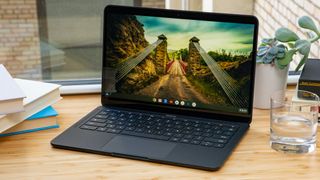
Specifications
Reasons to buy
Reasons to avoid
Google might've sadly shuttered its own laptop division so we won't be getting a new model, but you can still pick up a Pixelbook Go for a reasonable price - and it's basically the best Chromebook ever made.
When we tested it, we marveled at the super-long battery life and excellent 'Hush' keyboard, with the entire construction of the laptop feeling sturdy yet sleek. It's got a sharp 1080p webcam - perfect for virtual classes or video calls with friends - and naturally runs Chrome OS smooth as butter; the perfect union of Google's hardware and software.
Bear in mind that it's at the premium end when it comes to Chromebook pricing, so if you're on a budget, you might be better served elsewhere. That's just about our only real criticism, though: you get a lot for your money here, and Google is committed to ensuring Chrome OS remains a stable, secure, and child-friendly virtual environment for years to come.
Read our full Google Pixelbook Go review
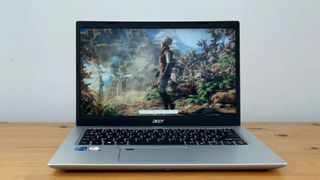
Specifications
Reasons to buy
Reasons to avoid
Chromebooks can be super-cheap, but the downside of Chrome OS is that it lacks the versatility and widespread support of Windows. If you're looking for a more conventional laptop without a high price tag, the Acer Aspire 5 is the way to go.
The Intel Core i5 processor will smoke the majority of Chromebooks around the same price point, even if it's nothing particularly impressive for a Windows laptop. With the Aspire 5's aggressive pricing though, it's great value - and you're getting plenty more, too.
The battery life is solid, and the full HD display is good for both homework and watching videos after school. There's a 720p webcam for video calls and distance learning too, and the whole design is pleasingly robust without being incredibly heavy. There aren't quite as many ports as we'd like (only one USB-C is a shame) but at this price point, it's honestly hard to argue.
Read our full Acer Aspire 5 review
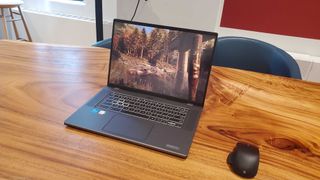
Specifications
Reasons to buy
Reasons to avoid
If your kid wants a machine for both schoolwork and gaming, you may want to consider a gaming Chromebook. The Acer Chromebook 516 GE is our current favorite of this rare breed of laptops, providing great performance in a sleek and sturdy chassis with a truly excellent screen. You'll pay a bit more than some of the cheapest laptops on this list, but the build quality justifies the price tag - this is a machine for a slightly older kid.
Bear in mind that these 'gaming Chromebooks' still use Chrome OS, so they can't directly run games from platforms such as Steam or the Epic Games Store. Instead, you can download and play games from the Google Play Store, and use cloud gaming services such as Xbox Game Pass and Nvidia GeForce Now. These require a subscription and a good internet connection, but grant you access to a wide library of games to stream on-demand - great for indecisive kids who are always looking to play something new!
Read our full Acer Chromebook 516 GE review
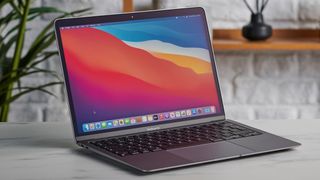
Specifications
Reasons to buy
Reasons to avoid
Although it might've been replaced by the faster, sleeker M2 MacBook Air (2022), the 2020 model - equipped with Apple's first-generation M1 chip - is still no slouch. A powerhouse productivity machine, the M1 MacBook Air is perfect for students no matter what level of education they're at.
Not only is it still capable of going toe-to-toe with many newer laptops in terms of performance, but the M1 model offers phenomenal battery life and the passive cooling design means that you'll never have to listen to noisy laptop fans. Back when we reviewed it, we praised the speedy performance, bright display, and comfortable keyboard - all things that hold true to this day. Oh, and it's quite a bit cheaper than the newer M2 model, too!
Read our full MacBook Air (M1, 2020) review
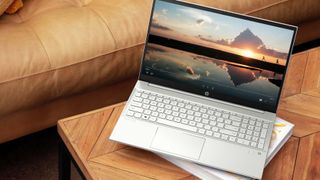
Specifications
Reasons to buy
Reasons to avoid
It's hardly the most exciting laptop around, but the HP Pavilion 15 is a reliable workhorse - and that's what makes it one of the best laptops for kids. It touts impressive specs (the kind you might expect from a pricier laptop) and an optional touchscreen display model, potentially a boon for kids who prefer a more tactile laptop experience.
HP Fast Charge is also a nifty inclusion, and a valuable one since in our review we did note that the battery life was a bit unimpressive. There wasn't much else to complain about though, and there's a variety of configurations available to suit your budget, though, so you won't have to spend the world to pick one of these up.
Read our full HP Pavilion 15 review
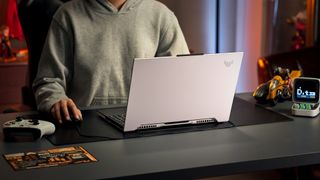
Specifications
Reasons to buy
Reasons to avoid
If your kid is a die-hard gamer but also needs a laptop for work as well as play, the Asus TUF Dash F15 is a sound pick. Unlike many gaming laptops, the Dash F15 doesn't bring with it an ostentatious design covered in gaudy LED lighting; just solid performance, good battery life (for a gaming laptop, anyway - it's not going to beat a MacBook), and a robust, straightforward chassis.
We only found minor niggles with it in our review, noting that the bundled Asus software was a bit finicky and that some of the ports were awkwardly positioned. It's surprisingly lightweight as gaming laptops go, not the huge powerhouse clunkers we've become accustomed to. It's also relatively affordable for the performance you're getting - though if you're hunting for something extra-cheap, you could check out the 2021 Asus TUF Dash F15 too.
Read our full Asus TUF Dash F15 (2022) review
The best laptop for kids: FAQs
What is a good first laptop for kids?
There’s a wealth of choices when it comes to laptops for kids, with some great options from manufacturers like Dell, Lenovo, and Acer. And although there’s no definitive answer here, we were impressed by the Acer Chromebook Spin 311.
This 2-in-1 Chromebook is versatile, lightweight, portable, and has a reasonable battery life. It’s not too expensive and is powerful enough to comfortably cover any kind of junior homework assignment.
Plus, if the worst comes to the worst and it gets unceremoniously dropped, it’s durable enough that it shouldn’t cause any lasting damage.
What is a good laptop for an 8-year-old?
As with the above, a suitable laptop for an eight-year-old should cover the same bases, while offering reliable security measures to protect your child while they’re web browsing.
Before buying, it’s worth checking whether your child needs access to certain software for their school work, as this will determine what type of laptop might be suitable (e.g. some software that runs on Windows won’t be supported by a laptop that runs on Chrome OS).
Beyond this, it’s a good idea to stick to more household brands that you know can be trusted, and pick a laptop capable of providing what your child needs it to do.
Should I get a Chromebook for my kid?
Chromebooks are great - they run on the super-lightweight operating system Chrome OS, which isn't as demanding on your hardware and can be set up in child safety mode to give you more control over your kid's browsing, perfect for younger users.
Chrome OS supports Android apps from the Google Play Store too, which means that if you get a Chromebook with a touchscreen it can be effectively used like a large phone or tablet.
However, it's important to note that Chromebooks aren't really for gaming (unless you get a game-streaming subscription) and Chrome OS doesn't support a lot of software that runs on Windows - of particular note here is that if your kid needs to use specific software for school, it's vital to check what operating systems it can run on.
How we test the best laptops for kids
Here at TechRadar, we believe in rigorously testing every piece of hardware that passes through our hands. If it fails to impress during testing, we'll always let you know; we won't recommend you buy any product that falls short of the performance median for its price range.
Our testing process varies from product to product, but we're always sure to run the most appropriate tests considering the target purpose of whatever we're reviewing. This means we're always sure to run plenty of gaming tests on a gaming laptop, or editing benchmarks for a desktop workstation PC. We also always examine the build quality of a product to see whether it aligns with the attached price tag.
If you want to know more about how we test and rate the computers in this guide, check out our explainer on how we test laptops and desktops to learn more.
Today's best laptop deals
Get daily insight, inspiration and deals in your inbox
Get the hottest deals available in your inbox plus news, reviews, opinion, analysis and more from the TechRadar team.

Christian is TechRadar’s UK-based Computing Editor. He came to us from Maximum PC magazine, where he fell in love with computer hardware and building PCs. He was a regular fixture amongst our freelance review team before making the jump to TechRadar, and can usually be found drooling over the latest high-end graphics card or gaming laptop before looking at his bank account balance and crying.
Christian is a keen campaigner for LGBTQ+ rights and the owner of a charming rescue dog named Lucy, having adopted her after he beat cancer in 2021. She keeps him fit and healthy through a combination of face-licking and long walks, and only occasionally barks at him to demand treats when he’s trying to work from home.
- Dua Rashid
- Rob WebbContributing Writer
